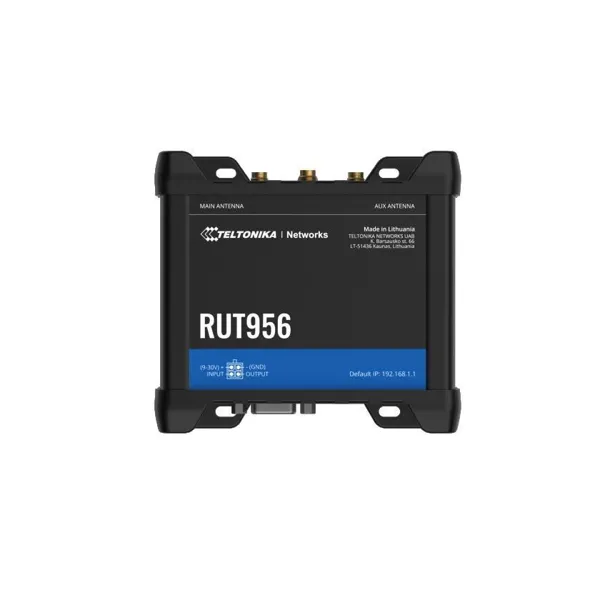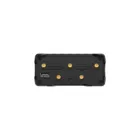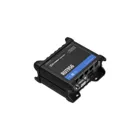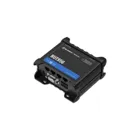RUT956_GLOBAL - RUT956 Global - industrial 4 GLTE router, Cat 4, up to 150 Mbps
RUT956 is an industrial router that combines cellular, Wi-Fi and wired connectivity options with automatic WAN failover and GNSS capabilities. Serial communication interfaces enable integration of a wide range of devices into the overall ecosystem, while I/O and advanced RutOS software facilitate device control, automation and event notification.
Specification
MOBILE
- Mobile module: 4G (LTE) - Cat 4 up to 150 Mbps, 3G - up to 42 Mbps, 2G - up to 236.8 kbps
- SIM switch: 2 SIM cards, auto-switch cases: weak signal, data limit, SMS limit, roaming, no network, network denied, data connection error, SIM idle protection
- Status: IMSI, ICCID, operator, operator status, data connection status, network type, bandwidth, connected band, signal strength (RSSI), SINR, RSRP, RSRQ, EC/IO, RSCP, data sent/received, LAC, TAC, cell ID, ARFCN, UARFCN, EARFCN, MCC and MNC
- SMS: SMS status, SMS configuration, send/read SMS via HTTP POST/GET, EMAIL to SMS, SMS to EMAIL, SMS to HTTP, SMS to SMS, scheduled SMS, SMS autoreply, SMPP
- USSD: Supports sending and reading of Unstructured Supplementary Service Data messages
- Black/white list: Black/white list of operators (by country or individual operators)
- Multiple PDN: Possibility to use different PDNs for multiple network accesses and services
- Band management: Band lock, display of the status of the band in use
- APN: Auto APN
- Bridge: Direct connection (bridge) between mobile ISP and device in the LAN
- Passthrough: Router assigns its mobile WAN IP address to another device in the LAN
WIRELESS
- Wireless mode: IEEE 802.11b/g/n, Access Point (AP), Station (STA)
- Wi-Fi security: WPA2-Enterprise - PEAP, WPA2-PSK, WPA-EAP, WPA-PSK, WPA3-SAE, WPA3-EAP, OWE; AES-CCMP, TKIP, auto-cipher modes, client separation, EAP-TLS with PKCS#12 certificates, deactivation of Auto-Reconnect
- SSID/ESSID: SSID stealth mode and access control based on MAC address
- Wi-Fi users: Up to 100 simultaneous connections
- Wireless connectivity features: Fast roaming (802.11r), Relayd, BSS transition management (802.11v), Radio resource metering (802.11k)
- Wireless MAC filter: Whitelist, Blacklist
NETWORK
- Hotspot: Captive portal (hotspot), internal/external radius server, radius MAC authentication, SMS authorisation, internal/external landing page, walled garden, user scripts, URL parameters, user groups, individual user or group restrictions, user management, 9 default customisable themes and the ability to upload and download customised hotspot themes
- Routing: Static routing, dynamic routing (BGP, OSPF v2, RIP v1/v2, EIGRP, NHRP), policy-based routing
- Network protocols: TCP, UDP, IPv4, IPv6, ICMP, NTP, DNS, HTTP, HTTPS, SFTP, FTP, SMTP, SSL/TLS, ARP, VRRP, PPP, PPPoE, UPNP, SSH, DHCP, Telnet, SMPP, SNMP, MQTT, Wake On Lan (WOL)
- VoIP passthrough support: H.323- and SIP-alg protocol NAT helpers that enable the correct routing of VoIP packets
- Connection monitoring: Ping Reboot, Wget Reboot, Periodic Reboot, LCP and ICMP for link inspection
- Firewall: Port forwarding, traffic rules, user-defined rules
- DHCP: Static and dynamic IP assignment, DHCP relay, DHCP server configuration, status, static leases: MAC with wildcards
- QoS / Smart Queue Management (SQM): traffic priority queuing by source/destination, service, protocol or port, WMM, 802.11e
- DDNS: Supports >25 service providers, others can be configured manually
- Network backup: Wi-Fi WAN, Mobile, VRRP, wired options, any of which can be used as automatic failover
- Load balancing: Balancing of Internet traffic across multiple WAN connections
- SSHFS: Ability to mount a remote file system via the SSH protocol
ETHERNET
- WAN: 1 x WAN port 10/100 Mbps, compliance with IEEE 802.3, IEEE 802.3u, 802.3az standards, supports auto MDI/MDIX
- LAN: 3 x LAN ports, 10/100 Mbps, compliant with IEEE 802.3, IEEE 802.3u standards, supports auto MDI/MDIX
SECURITY
- Authentication: Pre-shared key, digital certificates, X.509-certificates, TACACS+, radius, blocking of IP and login attempts, time-based login blocking, integrated random generator for passwords
- Firewall: Preconfigured firewall rules can be activated via WebUI, unlimited firewall configuration via CLI; DMZ; NAT; NAT-T
- Attack protection: DDOS protection (SYN flood protection, SSH attack protection, HTTP/HTTPS attack protection), port scan protection (SYN-FIN, SYN-RST, X-mas, NULL flags, FIN scan attacks)
- VLAN: Port and tag-based VLAN separation
- Mobile quota control: mobile data limit, customisable time period, start time, warning limit, phone number
- WEB filter: blacklist to block unwanted websites, whitelist to specify only allowed websites
- Access control: flexible access control of SSH, web interface, CLI and Telnet
VPN
- OpenVPN: multiple clients and a server can run simultaneously, 27 encryption methods
- OpenVPN encryption: DES-CBC 64, RC2-CBC 128, DES-EDE-CBC 128, DES-EDE3-CBC 192, DESX-CBC 192, BF-CBC 128, RC2-40-CBC 40, CAST5-CBC 128, RC2-64-CBC 64, AES-128-CBC 128, AES-128-CFB 128, AES-128-CFB1 128, AES-128-CFB8 128, AES-128-OFB 128, AES-128-GCM 128, AES-192-CFB 192, AES-192-CFB1 192, AES-192-CFB8 192, AES-192-OFB 192, AES-192-CBC 192, AES-192-GCM 192, AES-256-GCM 256, AES-256-CFB 256, AES-256-CFB1 256, AES-256-CFB8 256, AES-256-OFB 256, AES-256-CBC 256
- IPsec: IKEv1, IKEv2, with 14 encryption methods for IPsec (3DES, DES, AES128, AES192, AES256, AES128GCM8, AES192GCM8, AES256GCM8, AES128GCM12, AES192GCM12, AES256GCM12, AES128GCM16, AES192GCM16, AES256GCM16)
- GRE: GRE tunnels, GRE tunnels via IPsec support
- PPTP, L2TP: Client/server instances can run simultaneously, L2TPv3, L2TP via IPsec support
- Stunnel: Proxy for adding TLS encryption functionality to existing clients and servers without changes to the programme code
- DMVPN: Method for building scalable IPsec VPNs
- SSTP: Support for SSTP client instances
- ZeroTier: ZeroTier VPN client support
- WireGuard: WireGuard VPN client and server support
- Tinc: Tinc provides encryption, authentication and compression in its tunnels. Client and server support.
BACNET
- Supported modes: Router
- Supported connection types: RS485, TCP
OPC UA
- Supported modes: Client, Server
- Supported connection types: TCP
MODBUS
- Supported modes: Server, Client
- Supported connection types: RTU (RS232, RS485), TCP, USB
- User-defined registers: MODBUS TCP user-defined register block requests that can be read/written to a file within the router and used to extend MODBUS TCP client functionality
- Supported data formats: 8-bit: INT, UINT; 16-bit: INT, UINT (MSB or LSB first); 32-bit: float, INT, UINT (ABCD (big-endian), DCBA (little-endian), CDAB, BADC), HEX, ASCII
DATATO SERVER
- Protocol: HTTP(S), MQTT, Azure MQTT, Kinesis
MQTTGATEWAY
- Modbus MQTT Gateway: Enables sending commands and receiving data from the MODBUS server via MQTT broker
DNP3
- Supported modes: Station, Outstation
- Supported connection types: RS232, RS485, TCP, USB
DLMS
- DLMS support: DLMS - standard protocol for exchanging meter data
API
- Teltonika Networks Web API (beta) support: extend the capabilities of your device by using a set of configurable API endpoints to retrieve or modify data. For more information, please read this documentation: https://developers.teltonika-networks.com
MONITORING & MANAGEMENT
- WEB UI: HTTP/HTTPS, status, configuration, FW update, CLI, troubleshooting, multiple event log servers, availability notifications for firmware updates, event log, system log, kernel log, internet status
- FOTA: Firmware update from server, automatic notification
- SSH: SSH (v1, v2)
- SMS: SMS status, SMS configuration, send/read SMS via HTTP POST/GET
- Call: Restart, status, mobile data on/off, outgoing on/off, answer/hang up with timer, Wi-Fi on/off
- TR-069: OpenACS, EasyCwmp, ACSLite, tGem, LibreACS, GenieACS, FreeACS, LibCWMP, Friendly tech, AVSystem
- MQTT: MQTT Broker, MQTT publisher
- SNMP: SNMP (v1, v2, v3), SNMP Trap
- JSON-RPC: Management API via HTTP/HTTPS
- RMS: Teltonika Remote Management System (RMS)
IOTPLATFORMS
- Cloud of Things: Enables monitoring of: Device data, mobile data, network information, availability
- ThingWorx: Enables monitoring of: WAN type, WAN IP, mobile provider name, mobile network signal strength, mobile network type
- Cumulocity: Enables monitoring of: Device model, revision and serial number, WAN type and IP, mobile cell ID, ICCID, IMEI, connection type, network provider, signal strength
- Azure IoT Hub: Can provide device IP, number of bytes sent/received, temperature, PIN count to Azure IoTHub server, mobile connection status, network connection status, IMEI, ICCID, model, manufacturer, Serial number, revision, IMSI, SIM status, PIN status, GSM signal, WCDMA RSCP, WCDMA EC/IO, LTE RSRP, LTE SINR, LTE RSRQ, CELL ID, operator, operator number, connection type
SYSTEM CHARACTERISTICS
- CPU: Mediatek, 580 MHz, MIPS 24KEc
- RAM: 128 MB, DDR2
- FLASH memory: 16 MB, SPI Flash
FIRMWARE/ CONFIGURATION
- WEB UI: Update FW from file, check FW on server, configuration profiles, configuration backup
- FOTA: Update FW
- RMS: Update FW/configuration for multiple devices at once
- Maintain settings: Update FW without losing the current configuration
- Reset factory settings: A full factory reset restores all system settings, including IP address, PIN and user data, to the manufacturer's default configuration
FIRMWARECUSTOMISATION
- Operating system: RutOS (OpenWrt based Linux OS)
- Supported languages: Busybox shell, Lua, C, C++
- Development tools: SDK package with build environment
LOCATIONTRACKING
- GNSS: GPS, GLONASS, BeiDou, Galileo and QZSS
- Coordinates: GNSS coordinates via WebUI, SMS, TAVL, RMS
- NMEA: NMEA 0183
- NTRIP: NTRIP protocol (Networked Transport of RTCM via Internet Protocol)
- Server software: Supported server software TAVL, RMS
- Geofencing: Configurable multiple geofence zones
SERIAL
- RS232: DB9 connector, RS232 (with RTS and CTS flow control)
- RS485: RS485 full duplex (4 wires) and half duplex (2 wires). 300-115200 baud rate
- Serial functions: Console, serial over IP, modem, MODBUS gateway, NTRIP client
USB
- Data rate: USB 2.0
- Applications: Samba sharing, USB-to-serial
- External devices: Option to connect an external hard drive, a flash drive, an additional modem, a printer, a USB serial adapter
- Storage formats: FAT, FAT32, exFAT, NTFS (read-only), ext2, ext3, ext4
INPUT / OUTPUT
- Input: 1 x digital, dry input (0 - 3 V), 1 x digital, galvanically isolated input (0 - 30 V), 1 x analogue input (0 - 24 V), 1 x digital, non-isolated input (on 4-pin power connection, 0 - 5 V are detected as logic low, 8 - 30 V are detected as logic high)
- Output: 1 x digital open collector output (30 V, 250 mA), 1 x SPST relay output (40 V, 4 A), 1 x digital open collector output (30 V, 300 mA, via 4-pin power connection)
- Events: Email, RMS, SMS
- I/O juggler: allows specific I/O conditions to be set to trigger events
POWER
- Connection: 4-pin industrial DC socket
- Input voltage range: 9 - 30 VDC, reverse polarity protection; overvoltage protection >31 VDC 10us max
- PoE (passive): Passive PoE via free pairs. Power supply option via LAN1 port, not compatible with IEEE802.3af, 802.3at and 802.3bt, mode B, 9 - 30 VDC
- Power consumption: < 2 W idle, < 7 W max
PHYSICAL INTERFACES
- Ethernet: 4 x RJ45 ports, 10/100 Mbps
- I/Os: 2 x inputs and 2 x outputs on 10-pin industrial socket, 1 x digital input and 1 x digital output on 4-pin power connector (available from HW revision 1600)
- Status LEDs: 1 x two-colour connection status, 5 x mobile connection strength, 4 x ETH status, 1 x power
- SIM: 2 x SIM slots (Mini SIM - 2FF), 1.8 V/3 V, external SIM holder, eSIM (optional)
- Power: 1 x 4-pin power connector
- Input/Output: 1 x 10-pin industrial socket for inputs/outputs
- Antennas: 2 x SMA for LTE, 2 x RP-SMA for Wi-Fi, 1 x SMA for GNSS
- USB: 1 x USB-A connector for external devices
- RS232: 1 x DB9 socket
- RS485: 1 x 6-pin industrial socket
- Reset: Reboot/User default reset/Factory reset button
PHYSICAL DATA
- Housing material: aluminium housing, plastic panels
- Dimensions (W x H x D): 110 x 50 x 100 mm
- Weight: 287 g
- Mounting options: DIN rail, wall mounting, flat surface (all require additional kit)
OPERATING ENVIRONMENT
- Operating temperature: -40 °C to 75 °C
- Operating humidity: 10 % to 90 % non-condensing
- Protection class: IP30
REGULATORY & TYPE APPROVALS
- Regulations: CE, UKCA, ANRT, Kenya, CITC, ICASA, FCC, IC, PTCRB, Anatel, RCM, Giteki, IMDA, ECE R118, E-mark, UL/CSA Safety, CB, RoHS, REACH, NCC, C1D2
- Network operators: AT&T, Verizon, T-Mobile
EMC EMISSIONS & IMMUNITY
- Standards: EN 55032:2015 + A11:2020
EN 55035:2017 + A11:2020
EN IEC 61000-3-2:2019 + A1:2021
EN 61000-3-3:2013 + A1:2019
EN 301 489-1 V2.2.3
EN 301 489-17 V3.2.4
EN 301 489-19 V2.1.1
EN 301 489-52 V1.2.1
- ESD: EN 61000-4-2:2009
- Radiation immunity: EN 61000-4-3:2020
- EFT: EN 61000-4-4:2012
- Immunity to overvoltages (AC mains connection): EN 61000-4-5:2014 + A1:2017
- CS: EN 61000-4-6:2014
- DIP: EN 61000-4-11:2020
RF
- Standards: EN 300 328 V2.2.2
EN 301 511 V12.5.1
EN 301 908-1 V15.2.1
EN 301 908-2 V13.1.1
EN 301 908-13 V13.2.1
EN 303 413 V1.1.1
SAFETY(ORDINARY LOCATIONS)
- Standards: CE: EN IEC 62368-1:2020 + A11:2020, EN IEC 62311:2020, EN 50665:2017
RCM: AS/NZS 62368.1:2022
CB: IEC 62368-1:2018
UL/CSA Safety: UL 62368-1 (3rd ed., rev. 13 December 2019), C22.2 No. 62368-1:19 (3rd ed., Rev. 13 December 2019)
SAFETY (HAZARDOUS LOCATIONS)
- Standards: UL/CSA Safety: UL 121201, 9th Ed., Rev. 1 April 2021, CAN/CSA C22.2 No. 213, 3rd Ed. April 2021
- Hazardous Environments: Class I, Division 2, Groups A, B, C, D
Class I, Zone 2, Group IIC
-40°C ≤ Ta ≤ 75°C, T4, IP30















